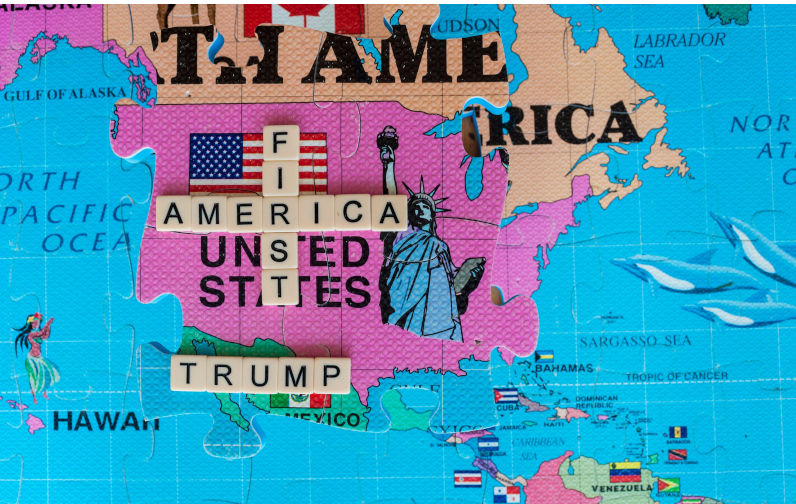Donald Trump’s election to the presidency is a Gift. Notwithstanding that it, and his subsequent behaviour, has induced involuntary bowel movements and Acute Disorientation Syndrome throughout the policy-making establishments of the Western alliance, his advent is not, therefore, without its merits if we are the richer for it.
The Gift? Clarity, an indispensable aid to strategic thinking. Specifically, it is an opportunity to see the US as it is, unadorned: a polity that, as I outlined just over four years ago on this site, fits well within the contours of Umberto Eco’s “Ur-Fascism” – original, or eternal fascism; fascism not beholden to only the more familiar versions which were popularly thought by a foolish posterity in the 1990s to have receded and were receding further in the West.
Consider the US in its Trumpian moment: It has elevated to its highest public office a coarse, vulgar, unprincipled, self-absorbed, erratic, narcissistic (when not solipsistic), misogynistic, racist, blatantly ignorant, and genetically dishonest man with a level of egotism “rarely exhibited outside of a clinical environment” who thinks that tweeting and issuing Executive Orders is a substitute for governing and who, when first elected in 2016, wanted his inauguration parade to include battle tanks and missile launchers (both successfully resisted by the Pentagon).
He is, however, the logical, unexceptional extension of evolving US strategic thinking and practice since the US decided to become an empire in its own right – which might be dated from 1898-1901, when it claimed sovereignty over Cuba, Hawaii, Guam, Puerto Rico, and the Philippines.
In stating this, two caveats are in order. First, Trump’s victory was not inevitable; certainty of this nature belongs in the realm of natural disasters – earthquakes, tsunamis, and avalanches.
Second, Trump is not to be regarded as a conclusion so much as a way-station or continuation of a long described trajectory influenced by synoptic forces of longstanding, latent, and disruptive magnitude.
For now, therefore, his ascendancy has the hallmarks of a revolution and not a rebellion because the factors enabling it are chronic and profound rather than acute and transient.
His point of arrival may be surprising to many, but it is within the margins of error and probabilities given the parameters of the extant US system.
And that system has produced a winning candidate and an administration reflective of him which the ancient Greeks knew as a kakistocracy – government by the worst, least qualified and most unscrupulous citizens.
Trump’s character is disfigured by being a sexual predator and delusional liar. Both, on the basis of a substantial corpus of evidence, are also indisputable but neither has previously constituted a precedent for disqualification.
The proposition that Trump phenomenon has spawned an era of “post-truth” is similarly without appreciable substance. Deliberate deceit and dishonesty have been endemic in politics and US politics provides some of the most of the most outrageous – from the cry “Remember the Maine” in 1898, to the “missile and bomber gaps” of the 1950s, to the August 1964 events in the Tonkin Gulf, to the Pentagon Papers, to Watergate, to Iran-Contra, and to Saddam Hussein’s alleged Weapons of Mass Destruction in the early 21st century. “Perception management” is the process, and “alternative facts” are the product.
As Australia is discovering to its cost by certain media emulating their American templates, truth is a commodity to buy, sell, manufacture or withhold; quite possibly it is consigned to irrelevance.
Recall that an aide to George W. Bush spoke with open contempt for the “reality-based community”, which he defined as people who “believe that solutions emerge as [the] judicious study of discernible reality”, and told The New York Times Magazine journalist, Ron Suskind, in 2004, “We’re an empire now, and when we act we create our own reality.”
What Trump has done, encouraged by his base, is to regard this as a challenge to his, and their, imagination. They proclaim a licence without limits.
This is where a closer look at Trump’s electoral victory last November is essential. It was more than a victory for him and the MAGA crowd; in Elon Musk’s recent phrasing, it is nothing less than, “the revolution of the people.”
Bombast in some ways, but accurate in many others, meaning that, unless it is understood through the dynamics and structures of revolution, the responses to it will be futile.
A question to start: why did a majority of American voters find it preferable to succeed Barack Obama, in the first instance, and Joe Biden in the second, with a president of proven mendacity who was supported by white supremacists, Christian Nationalists, Neo-Nazis, Klansmen and other extremists, and who, despite being commander-in-chief, does not understand the unusability of nuclear weapons?
The short answer to start: no matter that he was previously, and would be if re-elected, a loner-leader president of fascist disposition, he convinced them against all reason, he was united with them in the hostility to their enemies. Moreover, he is not intimidated by the much-vaunted American system of “checks and balances” – not least because they have too often proven unfit for purpose as a result of his undermining of them.
These forays against the Constitution and conventions point to the nature of the Trumpian revolution. And it is highly unusual. At the superficial level it is a political revolution – one that liberates the pre-revolutionary system from the restraints which the revolutionaries hold to be dysfunctional in terms of their ideal state and the conduct of its affairs.
Usually such revolutions keep the system essentially intact – people are changed, some laws are repealed or modified but the shape remains. With Trump, however, this is but a precursor to a systemic revolution which seeks to dismantle the existing system and replace it. Both are evidently in train.
Trump is central and fulfils the historical role and function of revolutionary leaders of all hues. From all that we know of him — and yes, it is a grab bag of impressions — he is a solitary person who knows that he is not really accepted even by the billionaire class; he seeks validation in a public role of historical significance.
Accordingly, he articulates a return to a utopia (imaginary and poorly defined) which resonates with his supporters who understand him to be promising the restoration they crave: to become equal with, even superior to, those they see as having displaced them; above all, he promises the opportunity to get even.
To put it briefly, in oversimplified terms and distortions, he conforms the causes of their grievances and the justification for their many and diverse hatreds.
It’s a symbiotic relationship based on mutual need. Trump — a miserable, unsmiling conspiracy medium, brazen in his affronts to all things decent, but who has the luxury of speaking openly what his followers know viscerally but incoherently — is the spearhead which gives the MAGA mass its voice and battle cries.
In action, the Trump revolution brings forth both the standard holy trinity of revolutionary strategies – fear, vengeance, and terror but also, given its author, greed.
It is of no matter that his and their detractors could claim that Trump’s election victories were a victory for ignorance and irrationality. For all the merit that this riposte contains, it is equally irrelevant, even anachronistic.
Extensive and intensive research over the last 70 years has consistently found that the majority of the American public have internalised their powerlessness at the ballot box.
Their consequent behaviour, determined by experience, is to ignore learning very much at all about politics, a habit which in turn leaves them without the knowledge to evaluate what, from time to time, gets through their filters of avoidance.
They are then prey to fantasies that cater to their situation – one being that the promise to “make America great again” is not recognised as undeliverable.
This should not surprise. Indeed, in so many cases it is compounded by a greater and growing social blight: 21% of adults in the US (43 million) are functionally illiterate; 54% (130 million) have a literacy level below 6th grade level (20% are below 5th grade level).
Drawn from these large populations of the ignorant and the illiterate, but not exclusively, there is another category composed of those who have chosen a strategy of electoral avoidance: in their millions — in excess of 80 million, or around 40% of eligible voters to be a little more precise — they do not vote.
We were warned of all of this; besides it was happening in plain sight but, seemingly, none of it registered. Perhaps the provenance of the heralds was in question, their accounts lacking security classifications and frightening if taken seriously.
For prescience on the fascism of Trump, consider an immersion in Hunter S. Thompson’s Hell’s Angels: The Strange and Terrible Saga of the Outlaw Motorcycle Gangs. As Susan McWilliams outlines his contribution, he saw, 55 years ago, the retaliatory, right-wing politics of the current period through the Hell’s Angels as harbingers of those who now describe themselves as “strangers in their own land”.
These, he described as the “men and women who know that, by all intellectual and economic standards, they cannot win the game” if the game is played according to the Constitution and the fundamentals of true democratic politics:
They lash out at politicians, judges, scientists, teachers, Wall Street, universities, the media, legislatures – even at elections. They are not interested in contemplating serious reforms to the system; they are either too pessimistic or too disappointed to believe that is possible. So the best they can do is adopt a position of total irreverence: to show they hate the players and the game.
Five observations drawn from the account of the new Trumpian order stand out. The first is that the abandonment of modern procedural justice, international law, and human rights describes the medieval period which precedes the Magna Carta (1215) and in which rulers had the prerogative to find people guilty by decree.
The second is that the longer the situation is routinised, the more likely it is that it will normalise its attendant pathologies.
The third was captured in 2012, by Charles Simic, in an article in The New York Review of Books when he wrote of the US that “years of indifference and stupidity” have brought whole populations, no less their graduates, to a state of ignorance, passivity, inattentiveness, and fatalism.
The ideal citizen of a politically corrupt state, such as the one we now have, is a gullible dolt unable to tell the truth from bullshit.
The accumulated consequences of the first three lead to the fourth. Much of the US population constitutes what in ancient Greece would be called an idiocracy – meaning people who deliberately choose not to participate in public-political affairs. That so many of them are also ignorant means that they can be easily mobilised and manipulated by a government deserving of the description kakistocracy.
And the fifth? If, in a democracy such as Australia’s it remains imperative for citizens, in the words of John Erskine, to observe “the moral obligation to be intelligent,” because as per Robert Bellah’s truism, “democracy means paying attention”, then the alliance with the US is untenable, an exercise in guaranteed self-harm.
Michael McKinley is a member of the Emeritus Faculty, the Australian National University; he taught Strategy, Diplomacy and International Conflict at the University of Western Australia and the ANU.

